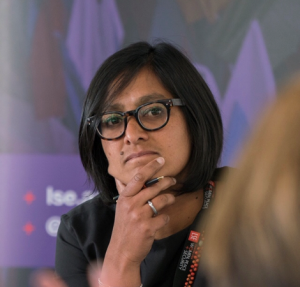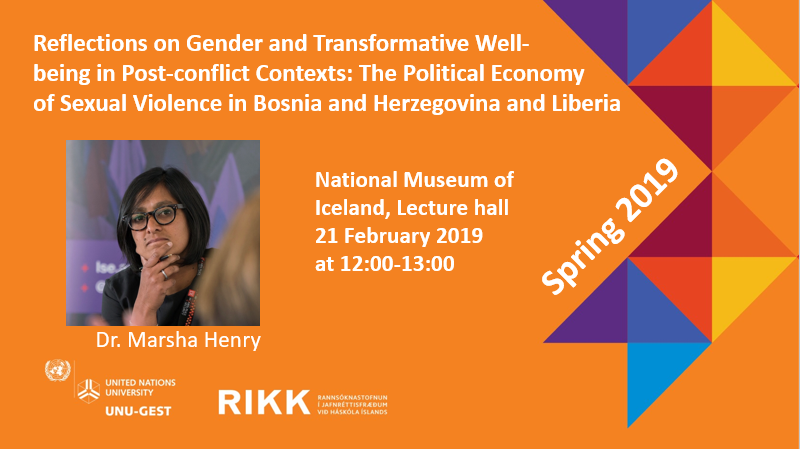(English below)

Dr. Marsha Henry
Dr. Marsha Henry, dósent í kynjafræði, er fjórði fyrirlesari í fyrirlestraröð RIKK – Rannsóknastofnunar í jafnréttisfræðum – og UNU-GEST – Jafnréttisskóla Háskóla Sameinuðu þjóðanna – á vormisseri 2019. Fyrirlestur hennar nefnist: „Hugleiðingar um kyn og umbreytandi velferð í kjölfar átaka: Pólitísk hagfræði kynferðisofbeldis í Bosníu-Hersegóvínu og Líberíu“ og að venju er fyrirlesturinn fluttur í fyrirlestrasal Þjóðminjasafns Íslands, fimmtudaginn 21. febrúar kl. 12:00-13:00.
Í fyrirlestrinum fjallar dr. Henry um rannsókn sem hún vann fyrir nokkrum árum á menningar- og félagslegu sambandi heilsufars og félagslegrar velferðar þeirra sem hafa orðið fyrir kynferðislegu ofbeldi í stríðsátökum (CRGBV) í Bosníu-Hersegóvínu og Líberíu. Rannsóknin miðaði að því að móta kenningu um kynjaviðmið og kerfislægt ójafnrétti til að skýra viðvarandi hindranir gegn því að konur nýti sér þá lögfræðiráðgjöf og samfélagslega stuðning sem frjáls félagasamtök veita konum sem orðið hafa fyrir ofbeldi.
Marsha Henry er dósent í kynjafræði og starfandi forstöðumaður Rannsóknastofnunar London School of Economics um konur, frið og öryggismál. Í rannsóknum sínum beitir hún gagnrýnum aðferðum í hernaðar- og friðarfræðum og femíniskum kenningum til að skoða pólitík kynbundins ofbeldis á fyrrum átakasvæðum.
Fyrirlesturinn er á ensku og er öllum opinn.
Hádegisfyrirlestraröð RIKK og Jafnréttisskóla Háskóla Sameinuðu þjóðanna á vormisseri 2019 er tileinkuð sambandi kyns, áfalla og heilsufars. Rannsóknir á áhrifum skaðlegrar reynslu á bernskuárum hefur á undanförnum árum veitt hugmyndum um áhrif uppvaxtarskilyrða á heilsufar og velferð á fullorðinsárum nýtt líf. Fyrirlesarar úr mismunandi greinum munu í fyrirlestraröðinni fjalla um viðfangsefnið út frá ólíkum sjónarhornum. Fyrirlestraröðin er haldin í samvinnu við Þjóðminjasafn Íslands.
Reflections on Gender and Transformative Wellbeing in Postconflict Contexts: The Political Economy of Sexual Violence in Bosnia and Herzegovina and Liberia
Dr. Marsha Henry, is the fourth lecturer in the 2019 RIKK – Institute for Gender, Equality and Difference & UNU-GEST – United Nations University Gender Equality Studies and Training Programme – lecture series during spring term 2019. Her lecture is titled: “Reflections on Gender and Transformative Wellbeing in Post-conflict Contexts: The Political Economy of Sexual Violence in Bosnia and Herzegovina and Liberia”, and will take place on Thursday, 21th of February, from 12:00 to 13:00.
Marsha will reflect on research conducted a few years ago which seeks to investigate the cultural and social contexts of health and social wellbeing for survivors of conflict-related gender-based violence (CRGBV) in Bosnia and Herzegovina, and Liberia. In particular, the study is interested in building a theory of gender norms and structural forms of inequality in order to understand the ongoing barriers to women’s engagement with civil society organisations and legal institutions focused on psycho-social and legal support for female victims.
Marsha Henry is the Interim Director of the Centre for Women, Peace and Security and Associate Professor in the Department of Gender Studies at the London School of Economics and Political Science. Marsha’s research interests focus on critical military and peacekeeping studies; the politics of sexual violence in post-conflict settings; and intersectional feminist theories and methodologies.
The lecture is in English, open to everyone and admission is free and can be found on Facebook.
The RIKK lecture series during the spring term 2019 will explore the connections between gender, health and trauma. Research into effects of childhood experiences has, in recent years, given rise to a renewed belief that the traumatic events during childhood, such as abuse and neglect, largely impact adult health and well-being. Current research underscores the role gender plays in both exposure, and response, to traumatic events, making the issues of recovery and treatment very complex. The series will examine trauma and addiction from a rights based perspective as well, taking into focus health systems and their reform, in order to engage in a discussion about responsiveness, accountability, and mechanisms for public involvement in the shaping of health policy and institutional mechanisms. In this lecture series, lecturers coming from different disciplines will interrogate these connections from various standpoints. The lecture series is held in collaboration with The National Museum of Iceland.
